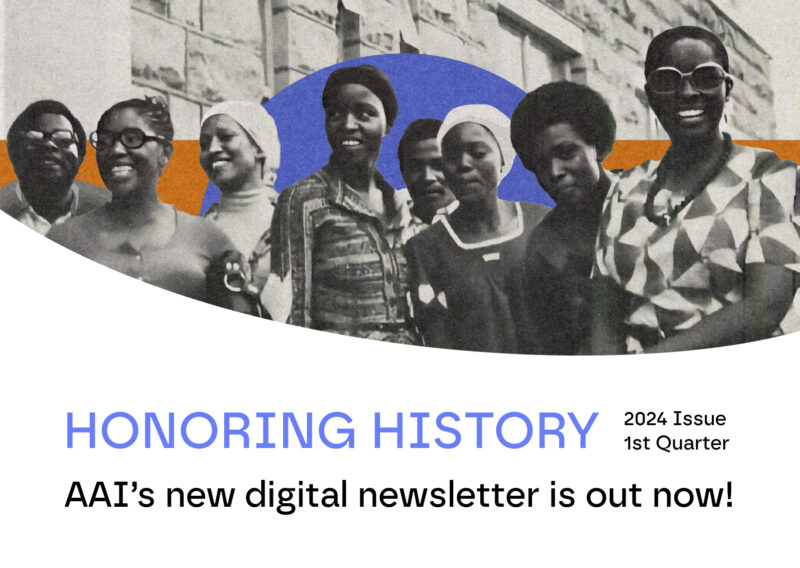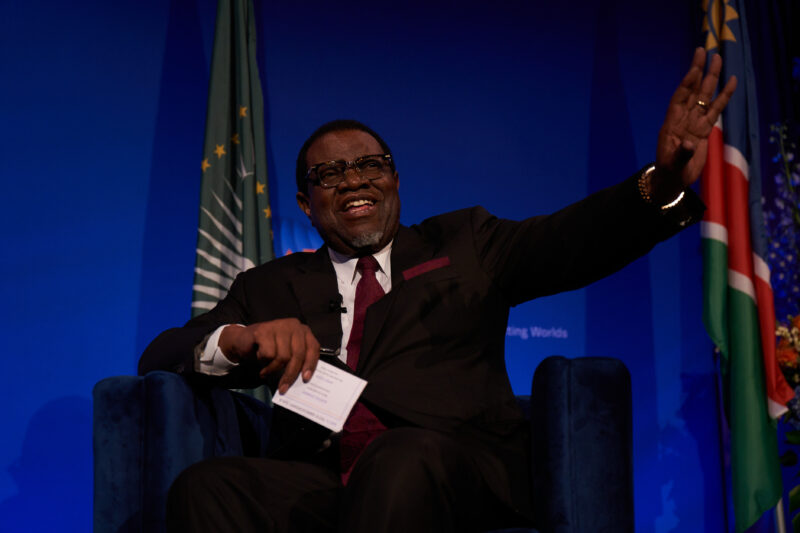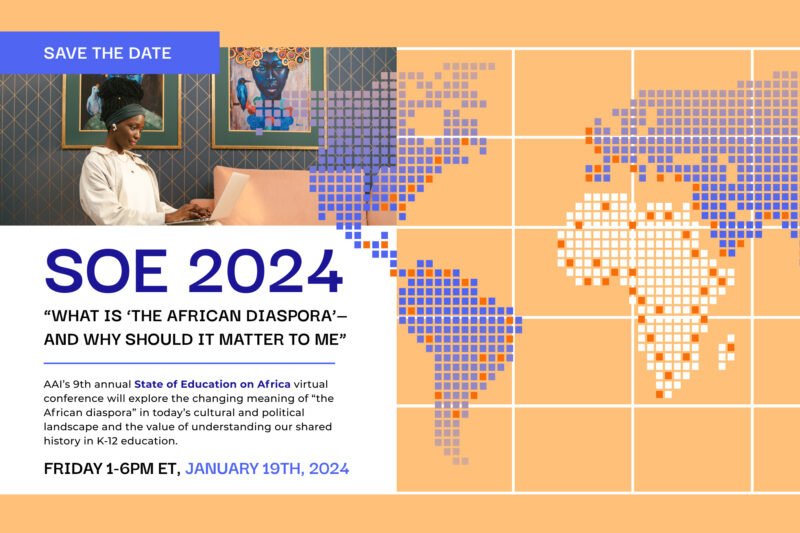Avoiding a Single Story is Key to Developing the Future of African Leadership
Reflections on AAI’s Symposium Evaluating Leadership Development Programs in Africa
By Melissa Howell
Award-winning Nigerian novelist Chimamanda Adichie warned us of the danger of a single story to tell Africa’s history, people and progress. At The Africa-America Institute (AAI), we are acutely aware of this. For too long, the continent of Africa has been crippled by the devaluation of social, political and human capital.
AAI President and CEO Amini Kajunju often disclaims what she calls the “Three Ds” – death, disease and despair – or narratives repeatedly used to describe the African continent. It is through this lens that a fourth “D”, deficit-orientation, focuses on what Africa lacks instead of emphasizing the positive developments and tremendous progress. The “deficit-orientation” approach has led to redundancies, inefficiencies and unsustainable projects across the continent. And the dearth of African-led leadership in designing development programs is a critical factor in the failure of many projects.
In early-December 2014, AAI, the University of Pennsylvania’s Graduate School of Education (GSE) and the African Studies Center, hosted a symposium entitled “The Future of African Leadership – Assessing Leadership Development on the Continent, to put forth impactful approaches to scaling up sustainable leadership programs and capacity in Africa.
Academics and thought-leaders came together for the half-day symposium to discuss the opportunities and challenges of evaluating leadership development programs on the African continent. The strengths-based and relational model of AAI’s Transformational Leadership Program (TLP), its program history and evaluation experiences served as the foundation to explore these topics.
The TLP program, AAI’s signature training program, offers advanced education and professional development training to African managers of Africa-based NGOs and small to medium-sized enterprises.

Dr. Sharon Ravitch, senior lecturer at Penn’s Graduate School of Education, gave a presentation on ” Strengths-based Leadership & the Challenge with Deficit-Oriented Models for Leadership Development”.
At the symposium, Dr. Sharon Ravitch, senior lecturer at Penn’s GSE and member of the 2013 TLP evaluation team, introduced key components of the program into the discussion. Ravitch and Dr. Michael Reichert were the lead evaluators of the TLP evaluation study, The Transformational Leadership Program: An Evaluation of Impact in a Capacity Building Leadership Program for Africa’s Social Sector.
Ravitch raised clear concern that the international development field is set up to re-inscribe deficit and that this deficit narrative is seldom discussed in public discourse. She offered examples from her own international work, where she witnessed the benefits of programs that leverage the wisdom and experiences of local people in designing and refining solutions to systemic issues.
Yet, the notion of defining competence only based on recognized bodies of knowledge must be challenged, Ravitch stated. Working from existing “funds of knowledge” are critical to building a development program owned and sustainable by the community through the cultural, social and intellectual capital already present, she noted, referencing the book, Funds of Knowledge: Theorizing Practices in Households, Communities, and Classrooms by authors Norma Gonzalez, Luis C. Moll, and Cathy Amanti.
Ravitch also discussed the weaknesses of deploying existing models to different contexts and recalled TLP’s approach to building a training program by fully engaging three university partners in a co-design process.
Moderated by Dr. Michael Reichert, a member of the 2013 TLP evaluation team, a panel of experts explored the evaluation of leadership development programs. The panel closed with a question from the audience: What constitutes data? And, what does data collection mean when storytellers, scribes and artists systematically collect data across Africa as well as through written documentation? Which [data collection approach] is more readily accepted in Western contexts?
Dr. Rodney Hopson, panelist and Professor at George Mason University, reminded attendees that assessing the impact of leadership development programs is methodological and political. Since assessing a program’s impact may take years to measure, development experts must examine who is conducting the evaluation. Ask, are there other things that can be assessed in the process of determining whether programs are working or not? It is imperative to build and promote a culture of leaders in a variety of different settings and develop appropriate skill sets where they are most culturally relevant.
Panelist Dr. Mojúbàolú Olufúnké Okome, Professor of Brooklyn College at CUNY, reiterated Hopson’s reference to the TLP report that highlights an assessment of individuals and communities impacted by the training program. She agreed that evaluation needs to happen at all levels and in multiple ways to ensure authenticity.
Okome emphasized the need of African programs to be selective in accepting funding, to know from where and whom it is coming, and to outline their priorities. When the priorities of the funding institutions do not align to the context in which that organization operates, then push back or reject the funding, she advised.
Dr. Teshome Alemneh, a panelist and program officer for Africa at Higher Education for Development, highlighted the increased focus on higher education institutions in the development field as “mechanisms for social and economic transformation”. Alemneh referenced the use of participatory methods, as done in the TLP, as a means of determining what data is valid. The purpose, he added, and intended use of data would also influence which method would be most relevant.
TLP program manager Melissa Howell shared key findings from the TLP evaluation report in a closing presentation.
Kajunju concluded the presentation with stories of two TLP alumni: the Honorable Sophia Abdi Noor, a Kenyan Minister of Parliament and founding member of Womankind Kenya, who credits her participation in the TLP as the definitive influence in pursuing a political career and subsequent participation in the Constitution review process; and, Tolulope “Tolu” Sangosanya, founder of LOTS Charity Foundation, which provides for the social, educational and health needs of 150 street kids and vulnerable children each day in “Dustbin Estates”, a shantytown in Ajegunle, Lagos, Nigeria.
Single stories negatively impact the design and implementation of leadership development. Author Adichie once recalled her ability to see herself within literature through the writings of Nigerian authors. Like Adichie, the TLP has ensured that Africa’s future leaders and leading institutions are the most relevant and contributing factor in its design and evolution. And as an institution, AAI remains committed to developing programs that lift up and build strong African leaders.
Presenters at AAI’s symposium on the future of African leadership in early-Dec. warned that a “single story” or negative narrative about Africa can impact leadership development programs on the African continent. Do you agree or disagree with the presenters? Is a “single story” really harmful to human capacity building? What do you think is the most critical component of leadership development?
Tell us why. Join the conversation on Facebook.
Melissa Howell serves as The Africa-America Institute’s Program Manager for the Transformational Leadership Program (TLP), which provides leadership training to NGO leaders in partnership with African colleges and universities.





